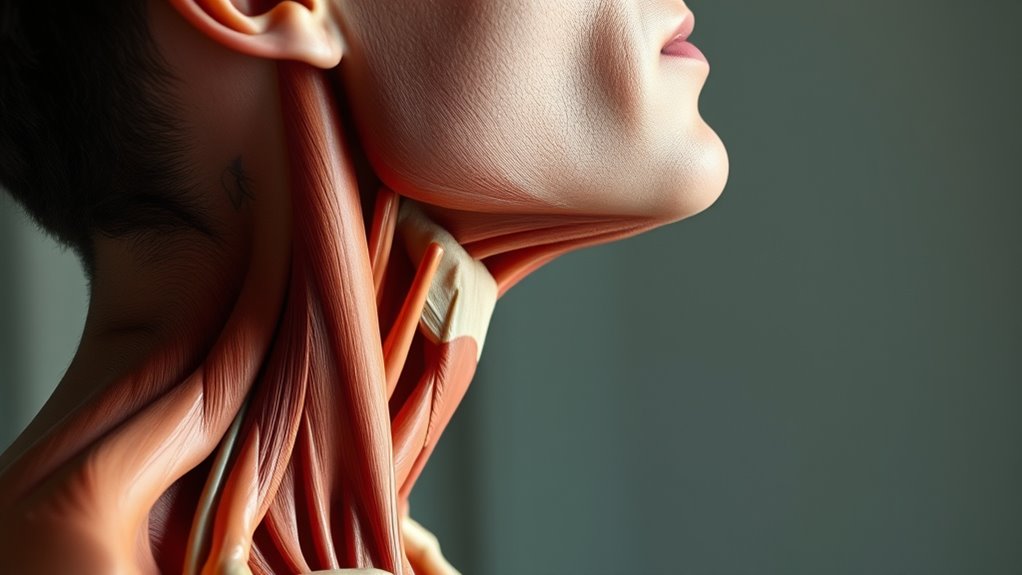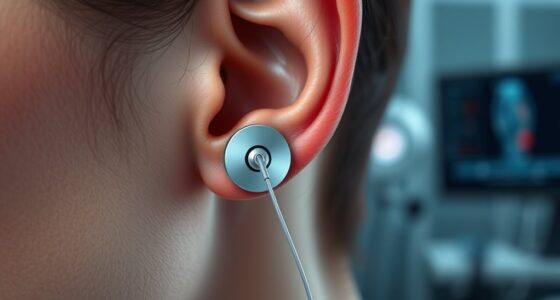Somatic tinnitus occurs when physical factors like neck and jaw muscle tension disrupt nerve signals and blood flow to your ears, causing ringing or buzzing sounds. Stress, poor posture, or jaw misalignment from teeth grinding or TMJ issues can tighten muscles, affecting how nerves and blood vessels function around your neck and jaw. These issues can influence your tinnitus symptoms, and understanding these connections can help you explore effective treatment options. Keep exploring to discover how addressing these physical factors might bring relief.
Key Takeaways
- Somatic tinnitus is ear ringing influenced by physical body factors, especially neck and jaw muscle tension.
- Misalignment or tension in neck and jaw muscles can disrupt nerve signals, affecting auditory perception.
- Movements like turning or tilting the head can worsen or trigger tinnitus symptoms.
- Addressing muscle tension and jaw alignment through therapy or dental treatments can alleviate somatic tinnitus.
- The interaction between neck, jaw, and nervous system underpins many cases of somatic tinnitus.

Tinnitus, the perception of ringing or buzzing in the ears, can sometimes be influenced by issues beyond the auditory system, particularly involving the neck and jaw. You might not realize it, but muscle tension in the neck and jaw misalignment can directly affect how you experience tinnitus. When your neck muscles are tense or your jaw isn’t properly aligned, it can put pressure on nerves and blood vessels that interact with your auditory pathways. This pressure can send abnormal signals to your brain, which your brain interprets as ringing or buzzing sounds. It’s a phenomenon known as somatic tinnitus, where physical factors outside the ear contribute to your symptoms.
Muscle tension in the neck area is often caused by stress, poor posture, or repetitive movements. Over time, this tension can tighten muscles around your cervical spine, leading to nerve irritation or altered blood flow. Since the neck is a complex network of muscles and nerves connecting to your head, any imbalance or tightness can influence your auditory perception. You might notice that certain movements, like turning your head or tilting your neck, make the tinnitus louder or softer. These positional changes highlight how deeply connected your neck muscles are to your tinnitus.
Neck muscle tension from stress or poor posture can influence tinnitus perception and its intensity.
Jaw alignment also plays a vital role. When your jaw isn’t properly aligned—perhaps due to teeth grinding, TMJ disorders, or misaligned bite—it can cause chronic muscle tension in your jaw muscles and surrounding areas. This tension can extend to the muscles that connect the jaw to your skull and neck, influencing nerve pathways linked to hearing. Malocclusion or jaw misalignment can also cause you to clench your jaw unconsciously, further increasing muscle tension. This ongoing strain can disrupt normal nerve signals and blood flow around your ear, contributing to or worsening tinnitus.
Understanding the link between muscle tension, jaw alignment, and tinnitus empowers you to address some causes directly. Techniques like physical therapy, jaw exercises, or stress management can help reduce muscle tension and improve jaw alignment. Sometimes, correcting jaw misalignment through dental adjustments or orthodontic work makes a significant difference in alleviating symptoms. Recognizing how these physical factors influence your tinnitus allows you to explore treatments beyond medication, focusing on restoring proper muscle function and alignment.
Additionally, selecting preppy dog names can reflect a refined personality that complements your own taste and lifestyle, much like choosing a name that resonates with your dog’s unique character. In essence, your tinnitus isn’t always just an ear issue; it can stem from how your neck and jaw are functioning. By paying attention to muscle tension and jaw alignment, you may find relief that conventional treatments haven’t provided. It’s a reminder that your body’s interconnected systems often hold the key to resolving complex symptoms like somatic tinnitus.
Frequently Asked Questions
Can Somatic Tinnitus Be Cured Permanently?
You might wonder if somatic tinnitus can be cured permanently. While complete, long-term cures are rare, effective tinnitus management strategies exist. Incorporate jaw relaxation techniques and other therapies to reduce symptoms. Addressing neck and jaw issues can profoundly improve your quality of life. Regularly consulting with healthcare professionals helps tailor treatments, making it possible to manage and sometimes lessen tinnitus symptoms, though a permanent cure isn’t always guaranteed.
Are There Specific Exercises to Reduce Neck-Jaw Tension?
To reduce neck-jaw tension, you can try specific exercises like jaw relaxation techniques and neck stretches. Gently open and close your jaw to relax the muscles, and perform slow neck stretches by tilting your head side to side and forward. These exercises help ease tension, improve circulation, and reduce discomfort. Make sure to do them regularly and avoid overexertion, and consult a professional if pain persists.
How Quickly Can Symptoms of Somatic Tinnitus Improve?
Imagine your symptoms as a river that can slow down with the right effort. You might notice improvements in somatic tinnitus within days to weeks, especially if you focus on muscle relaxation and posture correction. Consistent exercises and mindful habits help ease tension in your neck and jaw, which can lead to quicker relief. Stay patient and committed, and you’ll likely see your symptoms gradually diminish over time.
Is Somatic Tinnitus Linked to Other Neurological Conditions?
You wonder if somatic tinnitus is linked to other neurological conditions. There’s some evidence of neurological connections, as symptoms often overlap with disorders like migraines or nerve issues. However, somatic tinnitus primarily involves how neck and jaw interactions influence inner ear sensations. While it may share features with neurological conditions, it’s usually considered a distinct issue. If you notice other neurological symptoms, consult a healthcare professional for accurate diagnosis and tailored treatment.
What Age Groups Are Most Affected by Somatic Tinnitus?
You might notice somatic tinnitus affects various age groups, but it’s most common among adults aged 40 to 60. Age-related hearing changes can increase tinnitus prevalence, making this range more susceptible. Younger individuals rarely experience it unless linked to specific injuries or conditions. As you age, the likelihood of developing somatic tinnitus rises due to degenerative changes in hearing and nerve function, emphasizing the importance of addressing ear and neck health early.
Conclusion
Understanding somatic tinnitus and neck-jaw interactions reveals how physical movements can influence ringing in your ears. Did you know that up to 60% of tinnitus cases are linked to somatic factors like neck or jaw issues? Recognizing these connections empowers you to explore targeted treatments or therapies. By addressing neck and jaw health, you could markedly improve your tinnitus experience, gaining relief and restoring your quality of life.










